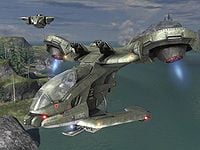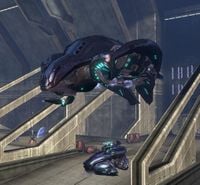VTOL
From Halopedia, the Halo wiki
- "Radio for VTOL, heavy lift gear."
- — Avery Junior Johnson[1]
Vertical Take-off and Landing, abbreviated to VTOL, is a classification of aircraft meaning that take-off and landing, rather than needing a runway down which a craft travels to build up speed and lift, is conducted vertically by thrusters or propellers. The key advantage of VTOL capability is that it enables an aircraft to hover over an area, allowing for longer loiter time, and allow the craft to operate from a diverse array of airfields, using less space to get airborne. VTOL capability uses more fuel than Conventional-Takeoff-and-Landing (CTOL) capability, though.[2]
UNSC
For the most part, UNSC aircraft use jet thrusters mounted on pivots to provide vertical thrust. The dominant advantage of this is that it is capable of being used for conventional thrust as well, including horizontal and lateral thrust, by tilting the jet engines. Aircraft such as the D77-TC Pelican, the Vulture gunship, and the AV-14 Attack VTOL use this type of VTOL configuration.
Another method is by using spinning propellers to provide lift, such as ducted fans or traditional helicopter rotors. Although not as lightweight or economic as jet thrusters, ducted fans provide a higher thrust-to-weight ratio, and can be more efficient, as well as having the advantage of producing less noise, always an advantage in a combat vehicle. Aircraft such as the Sparrowhawk use ducted fans to generate lift, with a fan shrouded in each wing[3]. Although there appear to be no UNSC combat helicopters in service, dropships having supplanted these in their traditional role as air cavalry and gunship support, helicopters are still used by civilian operators.[4]
Covenant
Covenant craft use artificial gravity generators to provide lift. These craft are carried on a cushion of anti-gravity, produced by artificial gravity generators. The Spirit and Phantom dropships are VTOL-capable craft, with the former using an artificial gravity field produced between its two side booms, and the latter using a somewhat more logical layout of ventral hull-mounted generators.
VTOL Aircraft
UNSC
- Dropship 77-Troop Carrier
- D77H-TCI Pelican Dropship
- AV-14 Attack VTOL
- UH-144 Falcon
- C709 Longsword-class Interceptor
- Sparrowhawk
- Vulture
Covenant
- Type-25 Troop Carrier
- Type-52 Troop Carrier
- Type-26 Ground Support Aircraft
- Seraph-class Starfighter
- Vampire

